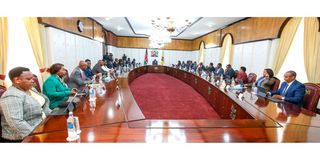Boost for gender parity push as Cabinet adopts CSW67 resolutions

President William Ruto chairs a Cabinet meeting at State House, Nairobi, on February 28, 2023. The Cabinet has ratified the resolutions of the 67th session of United Nations Commission on the Status of Women.
What you need to know:
- The United Nations Commission on the Status of Women (CSW) is the principal global intergovernmental body dedicated to the promotion of gender equality and women's empowerment.
- This year’s session took place from March 6–17 in New York, USA. More than 7,000 participants, including four heads of state and governments and 116 ministers, attended.
The Cabinet has ratified the resolutions of the 67th session of the United Nations Commission on the Status of Women (CSW).
A meeting chaired by President William Ruto on Tuesday resolved to formulate domestic policies and programmes to cement Kenya’s status as a trailblazer in achieving gender equity in emerging scientific and technological fields.Observers view the ratification as a major boost for the gender equality push.
CSW is the principal global intergovernmental body dedicated to the promotion of gender equality and women's empowerment. This year’s session took place from March 6–17 in New York, USA. More than 7,000 participants, including four heads of state and governments and 116 ministers, attended.
The resolutions include promoting innovation and technological change and education in the digital age to achieve gender equality. Countries are also required to develop digital tools and services to address the needs of women and girls, across sectors and geographies.
Reaffirming the importance of women's and girls’ full and equal participation in science, technology and innovation, the commission came up with measures that governments need to put in place to close the existing gender digital gap, noting increased public and private sector investments.
The forum also proposed the mainstreaming of gender in digital policies to remove barriers to equal access for all women and girls, including those living in poverty and in rural areas. Countries were also challenged to foster policies of zero tolerance for gender-based violence that occurs through or is amplified by technology.
The commission also rooted for the mainstreaming of a gender perspective in the design of emerging technologies and promotion of policies and programmes to achieve gender parity in emerging scientific and technological fields. Development of gender-responsive innovation that challenges gender stereotypes and negative social norms is also part of the proposals agreed by the commission.
Speaking during the closing ceremony, UN Women Executive Director, Sima Bahous termed this year’s conclusions a game-changer.
“They will bring forward our vision of a more equal and connected world for women and girls in all their diversity. It is our job, as we leave here today, to translate them into reality. The ultimate success of these agreed conclusions lies beyond their finalisation today, in how we will collectively take them forward. They bring us a vision of a more equal world. Let us translate them into reality for all women and girls," said Bahous.
The conference also expressed grave concern about the continuity and interrelation between offline and online violence, harassment and discrimination against women and girls and condemned the increase of such acts.
Rights and needs
The resolutions provide a blueprint for all stakeholders, including governments, the private sector, civil society and youth, to promote the full and equal participation and leadership of women and girls in the design, transformation and integration of digital technologies and innovation in a way that fulfils their human rights and needs.
The Commission called for more inclusive innovation ecosystems, and the promotion of safe and gender-responsive technology and innovation. It also called for inclusive and equitable quality education in science, technology, engineering, and mathematics, information and communications technology and digital literacy to ensure that all women and girls can thrive in a rapidly changing world.
The 67th session of the Commission on the Status of Women took place against the backdrop of continued backlash against women’s rights globally, from increased violence against women in the public space, to the gender impacts of the earthquakes in Syria and Turkiye, to the daily horror that women and girls face in emergency and crisis settings including in Afghanistan, Ukraine and Iran.



